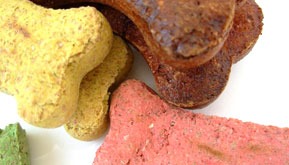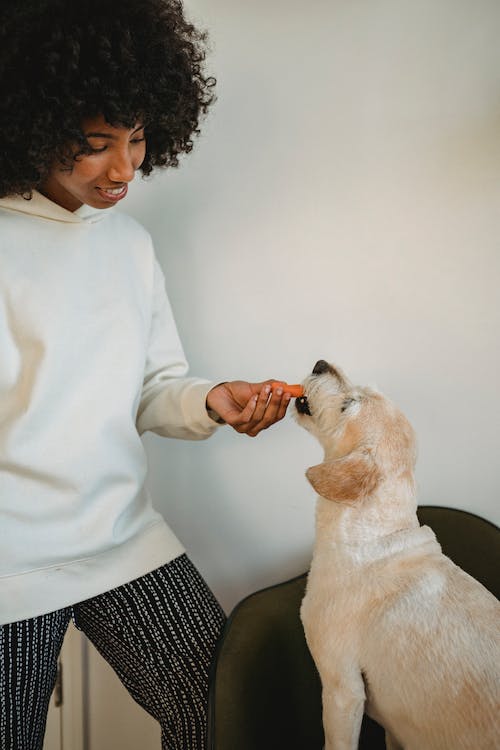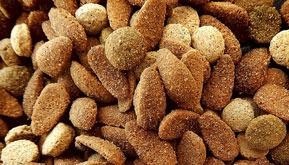Puppies grow fast, so you need to provide the proper nutrition to help them grow and mature healthily. They need energy, fuller muscles, and stronger bones and teeth, which they can achieve by eating the right foods.
Newborn puppies need nutrition from their mother’s milk until they are about four weeks of age. During their first week, they generally nurse at least every two hours. However, if a mother is out of the picture, you need to consult a veterinarian for advice on how to bottle feed newborns. They would need a canine milk replacement, not the cow’s milk we humans drink since this can cause them diarrhea.
At four weeks, you can start feeding them with solid food. Remember that younger puppies need to be fed more frequently than older dogs since this is the age when they would grow the fastest. Three- to six-month-old puppies need to be fed about three to four times a day. After six months, you can begin feeding them twice daily.
Puppy food must provide the right amount of protein, calories, vitamins, minerals, and fats they need for rapid growth and development, so the types of food you’d typically give adult dogs may not be adequate for them. These are the foods you can feed your puppy:
 1. Puppy food
1. Puppy food
While there is wet dog food, there is also puppy food. Commercial puppy food is most likely to have the extra nutrients your puppy would need until it reaches its full size. Use feeding charts on commercial puppy food labels as a guide. Those regular dog food labeled with “for all life stages” is also okay. Puppy food may come as kibbles, in cans or as semi-moist food in packets.
2. Breed-formulated food
This is puppy food specially formulated for specific breed types. Since smaller breeds tend to mature faster than bigger dog breeds, you might consider feeding your puppy with breed-formulated food. Small-breed puppy formulas provide concentrated nutrients to support their fast metabolism, while large-breed foods are formulated to help in the gradual development of the bigger pups’ bones and joints.

- Lean meat such as chicken, beef, and turkey – these are filled with healthy proteins and fats they need to maintain a healthy weight and right energy level.
- Salmon – another healthy source of protein, as well as omega-3 fatty acids good for puppy’s skin and coat.
- Yogurt – in the absence of mother’s milk, a plain yogurt (especially Greek yogurt) can be an alternative. It’s a great source of protein that supports strong bones and teeth.
- Rice and pasta – these are great sources of carbohydrates that gives energy to your puppy. Don’t flavor them with acidic or fatty sauces.
- Peanut butter – this is a yummy source of added protein and fiber. Choose only all-natural peanut butter and add it to your puppy’s dry food. Make sure that the commercial peanut butter does not contain xylitol, which can be potentially deadly for dogs. Better yet, make your own homemade peanut butter.
- Fruits – these do not only provide vitamins and minerals, but it can also be a healthy treat for your puppies while you train them. Here are some puppy favorites:
- Apples – source of potassium, fiber and vitamins A and C. Just don’t forget to remove the core and seeds.
- Oranges – a great source of vitamin C and also helps dental health. Peel off the fruit and remove the seeds before feeding it to your puppy.
- Banana – a source of potassium and fiber to benefit puppy’s digestive health.
- Watermelon – serves as refreshment and hydration for puppies, and is also a source of vitamins A and C. Don’t give it to puppies while seeds are still on the fruit.
Vegetables – although some may not believe it, vegetables are also good for dogs. Puppies would benefit from vegetables like:
- Pumpkin and sweet potatoes – these are good sources of vitamin A and beta-carotene. They also help ensure smooth digestion for your little ones.
- Peas – serve as low-calorie foods that help puppies feel full. It’s also a source of potassium, proteins and necessary dietary fibers.
- Green beans – a great source of vitamin C and K for healthy skin and coat.
- Lettuce – a source of vitamin A and C. It also cleanses the puppy’s blood.
- Carrots – they are high in vitamins, minerals, and fiber. Plus, the crunchy texture is also beneficial to the dog’s teeth.
- Cucumber – a source of vitamins B and C, as well as fiber and antioxidants.


 1. Puppy food
1. Puppy food Vegetables – although some may not believe it, vegetables are also good for dogs. Puppies would benefit from vegetables like:
Vegetables – although some may not believe it, vegetables are also good for dogs. Puppies would benefit from vegetables like: